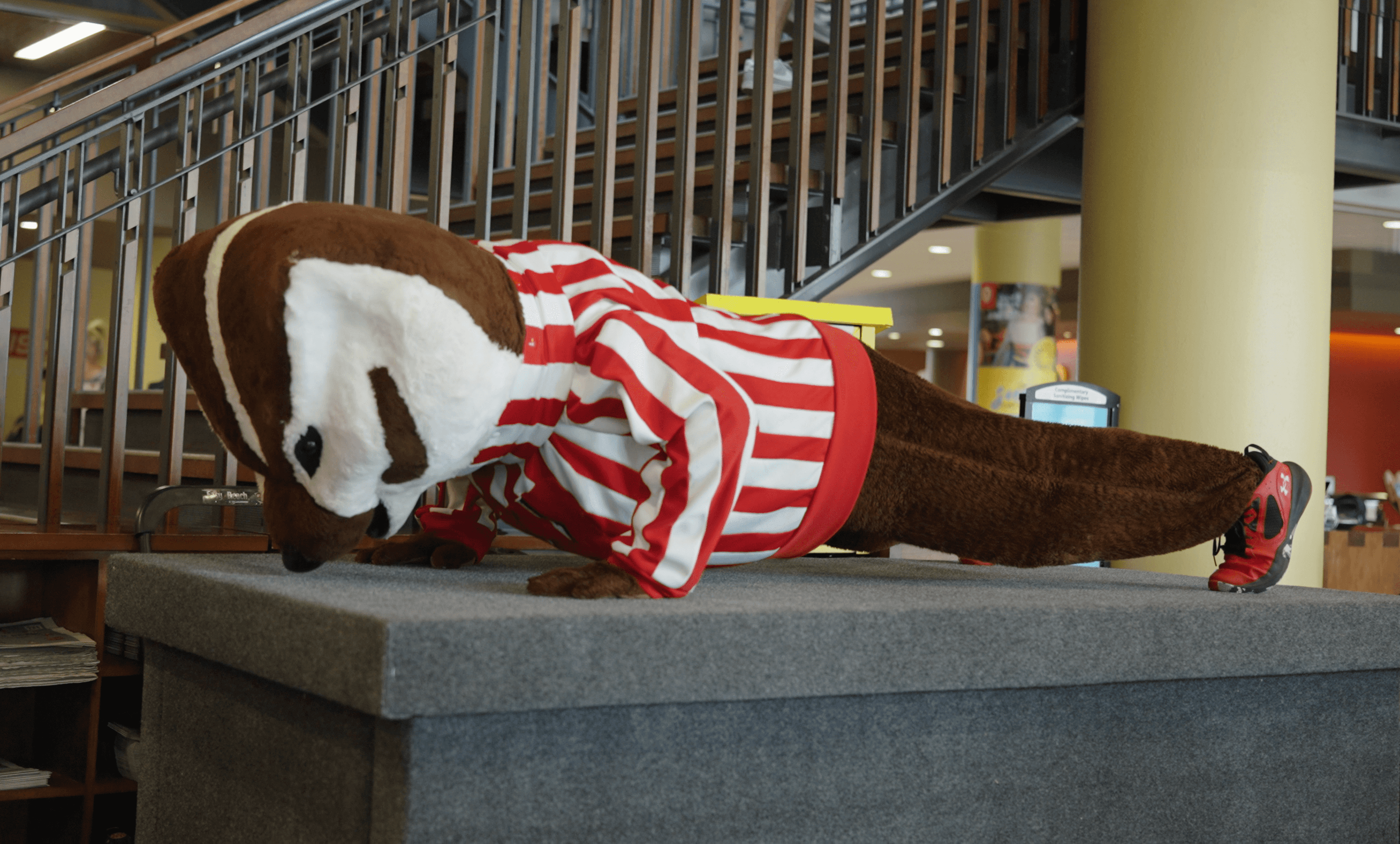At 5:30 p.m. on November 3, 2016, lecture room L160 in the Elvehjem building was at capacity. “To be, or not to be — that is the question,” the crowd recites in synchrony. The collective voice stumbles a bit around “To die, to sleep. / To sleep, perchance to dream …” but recovers and finishes the Hamlet soliloquy. “Well, now you don’t have to go to church on Sunday,” jokes Professor Joshua Calhoun.
He’s presenting his lecture “Hamlet, Hamlet, Hamlet” before the opening reception for First Folio! The Book That Gave Us Shakespeare. The Chazen Museum of Art is currently hosting Shakespeare’s First Folio as part of the national Folger Shakespeare Library’s tour to commemorate the 400th anniversary of the playwright’s death.
An assistant professor in the UW’s Department of English, Calhoun has found himself at the forefront of many Shakespeare in Wisconsin — or, #Shakesconsin — events. We caught up with Calhoun at Presenting Shakespeare: Posters from around the World, an exhibit running in tandem with the First Folio exhibition.
Chelsea Schlecht: In 30 seconds, define the First Folio.
Joshua Calhoun: It’s this monumental printing of most of Shakespeare’s plays in one volume. … At its core, it’s a monument to an author and an author’s plays put together by John Heminge and Henry Condell, two actors and friends from Shakespeare’s acting company. The way it’s being cast here is that it’s “the book that gave us Shakespeare.” And 18 of the 36 plays in there weren’t printed otherwise — and may not have been printed otherwise. They’re ones that we know well: The Tempest, Julius Caesar, Macbeth, Twelfth Night, A Comedy of Errors, As You Like It, Antony and Cleopatra.
CS: Would Shakespeare be mad that the plays he didn’t print are now the most popular ones?
JC: I don’t know that he cared [which got printed]. … Sometimes we forget that printing is a subset of publishing. Shakespeare did publish them, right? He published playbills that said, “Come see this play.” He published them — made them public — on stage. … He did publish them all — just not in book form. I think it’s interesting that the book is doing a different thing. It’s a different container for his ideas … You’ll hear people … say that Shakespeare is meant to be heard. … And that’s true, but not [about] the Folio. The Folio is, first and foremost, meant to be read.
CS: Well, Shakespeare didn’t make the Folio in the first place. Is there an argument that he didn’t want them all to be read?
JC: I’m always saying, “It’s not about what he wanted. His work is out there.” It’s going to get mixed and remixed. He borrowed and cut and pasted and copied from everyone else before him, and people have the right to do it to him. … You take these ideas, you turn them into your own, you mix them up, you remix it. King Lear was a play that existed before he wrote King Lear. Hamlet existed before he wrote Hamlet. Thomas Lodge’s romance was the exact basis for As You Like It.
CS: Well, the philosophy folks would say that nothing is original anyway.
JC: Right. I mean, that’s the biggest thing that I try to teach from Shakespeare. He doesn’t invent anything in the way we think of inventing — for him, inventing means selecting from an inventory of ideas he’s gathered from reading and listening. It’s a gathering of other ideas.
CS: He’s like a DJ.
JC: Oh, he is! Shakespeare’s writing emerged from his reading. Sometimes you hear the likening of Lin-Manuel Miranda’s Hamilton [to Shakespeare]. I say in class that understanding precedes critique. My colleague Jonathan Senchyne, who I’m co-teaching with right now in a course called Shakespeare and Media. … He gave this great talk that ended with “Drake-speare.” And he said, “Josh said, ‘Understanding precedes critique.’ And I’m saying, understanding precedes remix. [Senchyne] played [“Hotline Bling”], and then [showed] all those memes from the Drake video with the light box, but the light box is from some really well-known artist. … It’s all about the sampling and remixing, but it all makes so much more sense when you understand the inventory Drake was drawing from. Then you can understand it in a really interesting way. That’s what Shakespeare’s doing with different sources. That’s what Lin-Manuel Miranda is doing with his sources.
CS: Well, I was going to ask how Shakespeare is relevant today, but I feel like talking about Drake answered that.
JC: I keep getting this question of, why should we read Shakespeare? Why is it important? And I just reject it. I don’t know! I’m not the culture police. It’s not going to automatically make you a moral person, especially if you choose to use it without understanding it. The Nazis used Shakespeare as propaganda. Any political candidate you like or hate can use Shakespeare and get a little culture bump for it. Is that fair? No. What’s important, I think, is the way it’s used, and I think it comes back to understanding.
CS: Do you feel like Romeo and Juliet has been overtaught and overdone?
JC: That’s a good question. The thing is, Shakespeare does Romeo and Juliet over and over. If you think about it, A Midsummer Night’s Dream has two Romeo and Juliets. … You get to see what Romeo and Juliet would look like if it were a comedy … Then you get Pyramus and Thisbe, which shows you what Romeo and Juliet would be it if were a tragedy. … I think Romeo and Juliet is kind of this idea that keeps getting reworked. Does it get overplayed? I don’t know. I find myself sometimes concerned [about] what students read in high school: A Midsummer Night’s Dream, about teenagers running off to the woods and getting drugged. Then Romeo and Juliet: they’re going to fall in love, have sex right away, and then they’re going to kill themselves. Why would we want high school students to be reading about [that]? I think we don’t trust the power of it. … I think we think it’s tamer than it is. Like in the Chronicles of Narnia, Mr. Beaver says something about Aslan like, “I said he was good; I never said he was safe.”
CS: What’s not safe about it?
JC: This is the language of protest. … If you think of protest — it’s not safe. And Shakespeare, to me, is very seriously about letting us hear voices in protest — against society, against parents, against faith. And it’s hard to know how to react. … I taught [Titus Andronicus] last time I taught the big lecture course, and I don’t know when I’ll do it again. Titus Andronicus is a play that revolves around rape. And it’s horrifying. … It was just … it’s not safe. When you really take seriously what’s happening there, it’s about cannibalism and rape and mutilation and dismemberment and racism. It’s horrifying, and it takes time to process and talk about.
CS: But at the same time, all the students in that lecture hall are watching Game of Thrones and The Walking Dead. Those themes are still there. Why is it okay then?
JC: I think maybe the issue is [that] when you watch Game of Thrones … there’s a setup, even a warning. … I think the fear, for me, is that people won’t take [Titus Andronicus] seriously and then get sucker-punched. They’re like, “Oh, Shakespeare. I’m going to sit down and do my virtuous reading for class,” and now you’re in this horrible situation. I think they do think it’s good. And we have a lot of conversations: Are you a good person for reading Shakespeare? I think you can be. It can be a really good thing to read. I think Shakespeare gives us a groundwork for empathy in a way that few writers do. But it doesn’t magically make you a good person, and it portrays a lot of characters and incidents that are deeply troubling if we take them seriously. It’s good, but not safe. It has real power to move people, and I think you do have to take it seriously and handle with care.
CS: If you were to read the whole Folio, cover to cover, would you get a picture of who William Shakespeare was as a person?
JC: No, I don’t think so. … That’s what’s great. That’s why you really don’t usually know where his sympathies lie: religious sympathies, political sympathies. Is he a monarchist? Is he a republican? Does he have Catholic tendencies, or is he fully Protestant? Just when you think you know a character, [he or she shows] you something else. So no, I don’t. I think that’s why the sonnets weren’t popular. … I think that when people latch on to the sonnets later on … they want to know about Shakespeare. They want to read about Shakespeare autobiographically, and the sonnets become key [in the?] late 18th century. They get put back into the canon because people believe they’re telling us about Shakespeare.
CS: How did the Folio end up on the UW¬–Madison campus?
JC: Susan Baribeau should get credit for that. She’s the one who put in the grant and corralled people like me [to write letters]. … Part of the big thing, too, is we have the security. We have a safe space here at the Chazen where we can control relative temperature humidity. The interesting thing about books is … the plants and animals that make up the Folio don’t care about surviving. They want to biodegrade: that’s what they want to do. Hamlet talks about how a king makes progress through a beggar’s gut. Because a king dies, then is food for worms, then a fisherman grabs a worm and uses the worm to catch a fish, and the fish is eaten by the beggar. The king has made progress through the bowels of a peasant. The Folio wants to do that. It wants to go through the bowels of somebody who has no clue what a folio is. It wants to biodegrade, but we won’t let it. We refuse. We have this relative humidity and temperature to keep it stabilized. It gives you a sense of how it’s valued.
CS: What else should people know before they come to a #Shakesconsin event or to the Folio exhibit?
JC: Of the things people should know, they should know that I have lots of really interesting students. … Our Holding History program is about a cross-generational conversation that just doesn’t happen nearly enough on campus. What [readers] should know is that they should come. And instead of coming up and asking me a question about who wrote Shakespeare, they should ask me if I have any students who have cool ideas! That’s the great [thing], right? Connecting alumni with future alumni.







